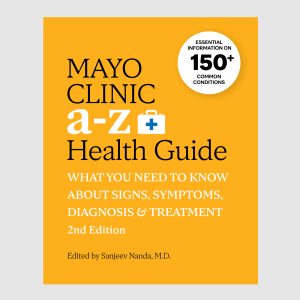
Mayo Clinic does not endorse companies or products. Advertising revenue supports our not-for-profit mission.
Women between ages 45 and 55 might attribute a variety of symptoms — from joint pain to night sweats — to menopause. Although menopause causes many symptoms, it’s not always the culprit.
Denise M. Millstine, M.D., a specialist in women’s health and integrative medicine at Mayo Clinic, says, “If you’re middle aged and having symptoms, talk with your healthcare team. There’s a long list of mimics that should be evaluated. Like, if you have unexplained weight loss with fevers and night sweats, that could be a serious health issue such as lymphoma. You really need to discuss what’s happening and maybe get some tests to figure it out.”
However, Dr. Millstine highlights, “It’s much more common that women are told, ‘You have fibromyalgia or depression’ when they’re actually going through menopause which can be frustrating. Given the average age of menopause being around 51 years old, perimenopause or the menopause transition should be high on the list of possible causes of symptoms in this age group.
Common menopause copycats
Pregnancy
Pregnancy can be a menopause copycat. If you’re pregnant, you stop getting periods, and you don’t always feel great.
There’s a reason people have unplanned pregnancies in their forties.
“When you’re perimenopausal, you have less predictable ovulation,” says Dr. Millstine. “Remember that ovulation is still likely to happen — but less frequently and without an easy-to-follow pattern.”
Hyperthyroidism or hypothyroidism
The thyroid gland makes the hormones that regulate metabolism. If you develop a thyroid condition, it can lead to hypothyroidism or hyperthyroidism. A blood test can determine if you have a thyroid condition.
- Hypothyroidism is when the thyroid doesn’t make enough thyroid hormone. It can mimic menopause with symptoms such as weight gain, fatigue, mood swings, forgetfulness and irregular menstrual cycles.
- Hyperthyroidism is when the thyroid makes too much thyroid hormone. With hot flashes, heart palpitations, anxiety and insomnia, hyperthyroidism can go undetected in women who are also in the menopausal age range.
Heart disease
Cardiovascular conditions also can resemble menopause — especially during times of stress. Cardiovascular disease symptoms can include sweating, lightheadedness, unusual fatigue and shortness of breath. If you think your symptoms might be caused by cardiovascular disease, see your healthcare team immediately.
Endometrial cancer
Endometrial cancer is a cancer of the cells in the uterus. Endometrial cancer starts in the lining of the uterus. Other types of cancer can form in the uterus, including uterine sarcoma, but they are much less common than endometrial cancer.
As in menopause, one of the first indications of endometrial cancer is irregular vaginal bleeding. Other symptoms include pelvic fullness or pain.
Autoimmune disorders
With autoimmune disorders, the immune system attacks the body’s own tissues. Some autoimmune disorders that may be mistaken for menopause include lupus, rheumatoid arthritis and Sjogren syndrome. Some shared symptoms are fatigue, joint pain, stiffness, headache, skin and vaginal dryness and memory loss.
Anxiety or depression
Menopause often coincides with a host of stressful midlife events, such as handling increased career responsibilities, having trouble with teens or children, caring for aging parents, becoming an empty nester, downsizing, getting divorced or losing a partner.
It’s important to understand whether your stress has become a mental health condition such as anxiety or depression or it’s a result of menopausal symptoms. Mental heal conditions might need mental health therapy or medications, while menopause symptoms would likely be treated differently.
Sleep apnea
Feeling unrested all the time? It could be menopause, but it might be sleep apnea. Like menopause symptoms, sleep apnea symptoms include disrupted sleep, fatigue, irritability, headache, elevated blood pressure and difficulty paying attention when awake.
Anemia
With anemia, the body doesn’t have enough healthy red blood cells to get adequate oxygen to the body’s tissues at times of demand. Anemia symptoms include tiredness, irregular heartbeat, dizziness, lightheadedness and headache — all of which are characteristics of menopause.
Uterine fibroids
Uterine fibroids are common growths in the uterus. Uterine fibroids are not cancer. Like menopause, uterine fibroids can lead to heavy menstrual bleeding as well as longer, more frequent and more painful periods. The loss of blood from uterine fibroids can also cause anemia, which can lead to other symptoms.
How will my healthcare team diagnose my problem?
“Laboratory tests can detect many of the conditions that could mimic menopause for women,” says Dr. Millstine. “So if you come into the clinic, you’ll know whether it’s menopause or something like arthritis or a thyroid condition. Then a qualified healthcare professional can review your medical history and determine what plan is best for whatever is happening.”
Mayo Clinic does not endorse companies or products. Advertising revenue supports our not-for-profit mission.

Relevant reading
Becoming Dr. Q
The inspiring story of a young Mexican immigrant who became a renowned neurosurgeon.





















